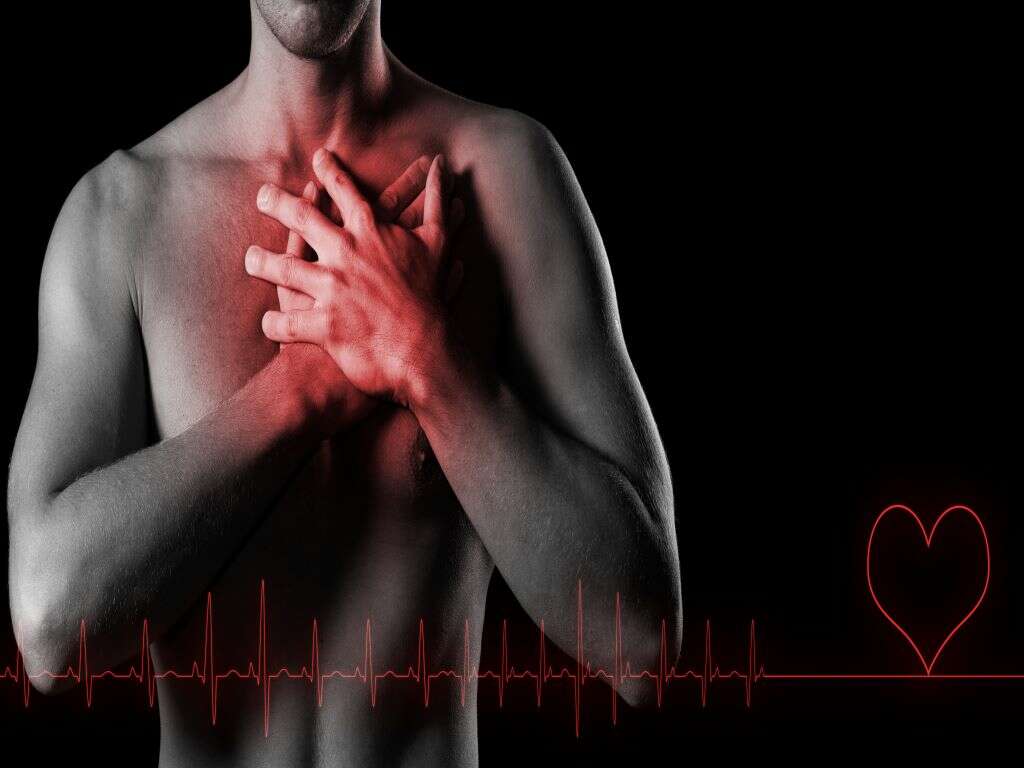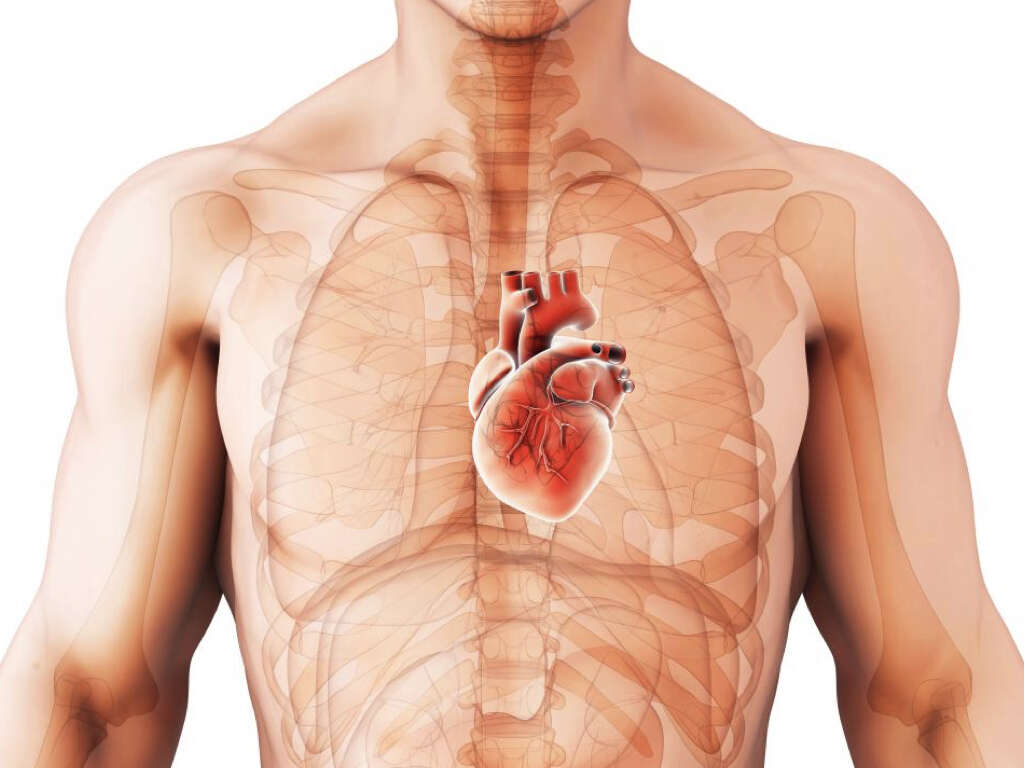10 Cardiomegaly Symptoms
 Article Sources
Article Sources
- 1. 'Enlarged Heart (Cardiomegaly): Causes, Symptoms, Treatment.' Cleveland Clinic, my.clevelandclinic.org/health/diseases/21490-enlarged-heart-cardiomegaly
- 2. 'Syncope: Symptoms, Causes, Treatments.' Cleveland Clinic, my.clevelandclinic.org/health/diseases/17536-syncope
- 3. ’Gastrointestinal Bleeding.’ Mayo Clinic, Mayo Foundation for Medical Education and Research, 15 Oct. 2020, www.mayoclinic.org/diseases-conditions/gastrointestinal-bleeding/symptoms-causes/syc-20372729
- 4. ’Chest Pain.’ Mayo Clinic, Mayo Foundation for Medical Education and Research, 8 Dec. 2017, https://www.mayoclinic.org/diseases-conditions/chest-pain/symptoms-causes/syc-20370838
- 5. ’Practical Tips to Reduce Bloating, Belching and Gas.’ Mayo Clinic, Mayo Foundation for Medical Education and Research, 13 Feb. 2020, www.mayoclinic.org/diseases-conditions/gas-and-gas-pains/in-depth/gas-and-gas-pains/art-20044739
Cardiomegaly is the medical term for an enlarged heart. It usually occurs when their is an underlying condition. It may cause problems with the efficacy of pumping the blood, which increases the risk of heart failure or stroke. Enlarged hearts are linked to a family history of cardiomegaly, substance abuse, hypertension and a sedentary lifestyle.
Cardiomegaly is cared for by managing the conditions that cause the heart to thicken or dilate. Depending on the cause, cardiomegaly can be either temporary or permanent. Although sometimes asymptomatic, cardiomegaly is generally associated with several symptoms.1‘Enlarged Heart (Cardiomegaly): Causes, Symptoms, Treatment.’ Cleveland Clinic, my.clevelandclinic.org/health/diseases/21490-enlarged-heart-cardiomegaly
Fainting
Fainting can be a symptom of an enlarged heart. The medical term for fainting is syncope. It is caused when there's a temporary drop in the blood flow to the brain. Blood pressure is most likely to drop in people with cardiomegaly when they change positions, for instance, going from standing to lying down. When blood pressure drops, it can affect blood flow through the body and cause a person to pass out.
When someone faints, they will likely become conscious right away. Confusion may continue to linger for a few moments.2‘Syncope: Symptoms, Causes, Treatments.’ Cleveland Clinic, my.clevelandclinic.org/health/diseases/17536-syncope

Arrhythmia
People with an enlarged heart could experience abnormal heart rhythms, also known as arrhythmia. Arrhythmia affects the rate of heartbeats. It occurs when the electrical impulses that regulate the heartbeat are functioning improperly. People with arrhythmia may experience heartbeats that are too fast, too slow or erratic. The sensation may be like a racing or fluttering feeling in the neck or chest.
Although these palpitations are usually harmless, arrhythmia can interfere with blood flow to the body and cause damage to vital organs.

Chest Pain
Chest pain is a frequent complaint of people with cardiomegaly. It can present itself as various sensations. People with chest pain describe feelings of pressure, burning or tightness. Others cite sharp, stabbing or aching pains. It can be a vague discomfort or acute pain. Chest pain can sometimes radiate to the back, neck, shoulders and arms.
Even if it's mild, chest pain should always be taken seriously. People experiencing these sensations should seek medical attention immediately.4’Chest Pain.’ Mayo Clinic, Mayo Foundation for Medical Education and Research, 8 Dec. 2017, https://www.mayoclinic.org/diseases-conditions/chest-pain/symptoms-causes/syc-20370838

Coughing
Coughing can be a symptom of an enlarged heart. A cough is a voluntary or involuntary expulsion of air from the lungs that clears the breathing passage. It's the way the body gets rid of irritants. A cough occurs when the nervous system sends an alert to the brain, causing the muscles in the chest to contract and expel a burst of air.
Coughing can be annoying and uncomfortable. This symptom is especially common in people with cardiomegaly when they're lying down.

Dizziness
People with an enlarged heart sometimes experience dizziness. The term dizziness can be used to describe a broad range of sensations. Light-headedness, unsteadiness and disorientation are commonly associated with dizziness. People experiencing dizziness report feeling faint, weak or unsteady.
It may also lead to an illusion that a person or their surroundings are spinning, also known as vertigo. Although not dangerous on its own, dizziness can affect balance and may cause falls.

Fatigue
Cardiomegaly is frequently associated with fatigue. Fatigue is a feeling of weariness that can interrupt daily life. More than feeling tired, the symptom is described as overwhelming exhaustion.
Either physical or emotional stress may cause fatigue in the body. It can arise if the heart is unable to pump blood to the body's muscles properly. People with cardiomegaly may also experience emotional stress when coming to terms with the realities of living with a heart condition.

Shortness of Breath
Shortness of breath may be a sign of an enlarged heart. The medical term for shortness of breath is dyspnea. It's generally described as a tightness in the chest that may prevent a person from being able to draw a full breath.
People also cite feeling as though they can't get oxygen quickly enough or needing to breathe more rapidly. People with cardiomegaly are more likely to experience breathing problems when engaging in physical activity or lying flat.

Swelling
Swelling, also known as edema, in the ankles, feet, legs and abdomen is a common symptom of cardiomegaly. Edema is caused when too much fluid is trapped in the body's tissues. People experiencing swelling may notice stretched and shiny skin. Another sign of edema is the skin's retention of a dimple after being pressed.
The onset of swelling and puffiness can be either slow or sudden. Tightness and pain are commonly associated with this condition.

Stomach Bloating
Cardiomegaly may cause stomach bloating. People generally describe bloating as a full, tight or swollen sensation in the stomach. It's sometimes associated with mild to sharp abdominal pain. The stomach may also become hard and visibly distended.
Bloating occurs when air or gas builds up in the gastrointestinal tract because it can't pass through belching or flatulence. Severe bloating can lead to discomfort or embarrassment and may interfere with daily life.5’Practical Tips to Reduce Bloating, Belching and Gas.’ Mayo Clinic, Mayo Foundation for Medical Education and Research, 13 Feb. 2020, www.mayoclinic.org/diseases-conditions/gas-and-gas-pains/in-depth/gas-and-gas-pains/art-20044739

Abdominal Bleeding
Abdominal bleeding can be a sign of an enlarged heart. Bleeding can be either obvious or hidden. Blood may appear in vomit, with a red or dark brown color and the texture of coffee grounds. Abdominal bleeding may also show up as rectal bleeding in the stool or as black and tarry stools.
Less noticeable signs of abdominal bleeding include light-headedness, difficult breathing, fainting and chest or abdominal pain.3’Gastrointestinal Bleeding.’ Mayo Clinic, Mayo Foundation for Medical Education and Research, 15 Oct. 2020, www.mayoclinic.org/diseases-conditions/gastrointestinal-bleeding/symptoms-causes/syc-20372729











